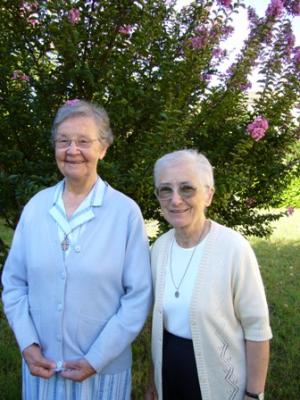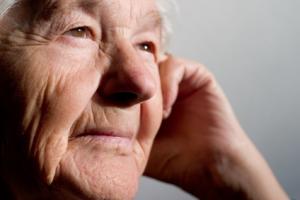 |
I am old…but I am young… and I live in a home for retired people.
I am old but I am young. My hair is like flakes of snow.
My brow is lined, as is the whole of my face
My actions are slow and my walk is hesitant.
But my vision is deep; my long years of life, my many experiences
My sorrows and my joys have enriched me beyond measure.
I am old … I am young … open
In the morning when my bedroom door is opened onto my world
I love to hear my name called as I am greeted
And invited to accept a new day.
It may be a bit mysterious no doubt,
perhaps heavy with the weight of my illness
But I smile in spite of everything.
I am old …but I am young and energetic.
I like to take part in activities
To make use of my creativity
To stimulate my ageing senses
As I share my story with the other residents
Picking through the memories of our youth,
And discovering the richness of our lives.
|
I am old …but I am young and if,
at times I seem to be bowed down by pain,
By the inevitable dependence
I think of those around me
Of all their respectful and discreet acts of caring.
Of the thousands of acts of service and kindness that are offered to me
And I tell myself that I must give my small contribution
To the building up of the world
I am old …but I am also young having lived a full life
Which perhaps cannot be described in words
and which seems to fade away little by little.
To listen to my story requires a lot of patience and understanding
On the part of those who visit me
That is when my demeanour becomes beseeching
Showing my distress, my concern
It is then that a silent presence is invaluable.
I am old …but I am young when I see a friendly face
Approach me to meet me
That is when with the whole of my being
I respond with a smile and I murmur:
« Every person is a sacred story
The person created in the image of God »
Josette Molinié
|

OLD AGE IN
PARAGUAY
Here I would like to share with you some of my impressions of the situation of elderly people in my country. As I do so I am aware of feelings of sadness and even of concern.
Often when some people speak of the elderly, they use adjectives such as: fulfilled, wise, tender, and loving. But it has to be said that frequently these words are just concepts. While the elderly are valued and respected simply because of their age and because they have given their lives for their children and grandchildren (many grandmothers act as mothers to their grandchildren), nevertheless there are some elements that cause us sadness and concern.
In many families, especially in the cities, grandparents, when they have lost their physical and mental faculties, are often badly neglected. For example, I have heard the sons and daughters of an elderly person say: “We have put grandmother in a place of her own so that she is more quiet and so that the children don’t bother her”. What is really happening is that the grandmother is separated from the rest of the family so that she does not disturb the family with her needs for care, love and company. She is there in her little room, lonely, sad and feeling that she is a nuisance to the rest of the family, who in this day and age of huge social changes, have acquired a lifestyle and a mentality that is very different from that of a few decades ago.
In some cases, thankfully still comparatively rare, the elderly are confined to a residential care unit where they are left abandoned and alone.
Our new Government has promised to bring about change in our society. However it is sad to think that our elderly will probably never see these longed-for changes. In
Paraguay, there is no system of social security for those in the third age. This fact raises even more concern for the welfare of our older citizens who have no concessions even for travelling on public transport.
There is some improvement in the area of healthcare with the introduction of free treatment for all in public hospitals; nevertheless if an older person has to have an operation or more expensive medication this raises problems for their families.
That is why I believe that there is a profound contradiction between what is said about the elderly and what is done to care for them. Still it has to be said that things are different in rural areas where there is much more esteem and care for grandparents. But it is still worrying to contemplate and analyse the situation of older people in
Paraguay.
Daniela Muzzachi
|
|

Caring for elderly people in Sri Lanka
A Beautiful tradition in the Sri Lankan families is the quality of taking care of their elders. The majority of the elderly people in the country live in the extended family settings with their kith and kin, assisting in income earning activities that are mutually supportive. Many married children feel a great sense of responsibility for their parents. They provide all the necessary facilities for them such as health care, food, shelter, leasure etc. In return the elderly people also undertake house hold activities such as cooking, looking after the grand children while parents are at work and accompanying school-going children. In the rural agricultural settings a big hand is given by them for cultivation.
In society the elders are held in high esteem and looked up to, as valuable resource persons with skills, experience and wisdom. The historical, religious and cultural background of Sri Lanka requires that the elderly are cared for at home by family members or relatives. The sacred relationship between the elders and the rest of the family is expressed and experienced in giving and receiving the blessing of the elders at various important events of life. One can be proud that still elders are considered as custodians and transmitters of the cultural heritage.
The varied services and facilities provided by the Sri Lankan government for the elderly are to be appreciated. International and Local Non government organizations play a vital role in assisting a care and well-being of elderly people.
It is unfortunate however to see this strong bond between the elderly and their families and the log-standing respect given to them are gradually disappearing from society. This can be accounted for, by the great shift from the extended family to nuclear family. It is also true that the rapid socio economic changes in the modern society have an impact on this. Another factor that aggravate the above situation is migration. Specially of women seeking jobs to support their families. At present, this has become crucial with the post war situation, where many elderly are left homeless and lonely.
Undoubtedly all this speaks loud calling us to go back to our roots, the sources that have given us the sap of life assuring them once more their due place in society, in family and uphold their dignity with respect and love.
Dammika Fernando
|
|
ELDERLY PEOPLE IN THE DEMOCRATIC REPUBLIC OF THE CONGO
|
|
|
In Africa, especially in the Congo, the elderly have always occupied a very special place in society. On the one hand they are well protected as they are thought to embody wisdom; on the other hand they can be feared and shunned because some people believe that they use their wisdom in a negative way to harm others through witchcraft. These two ways of looking at and relating to older people are frequently present in our society.
When we look at this reality, we must remember that in the not too distant past, reading and writing were unknown. Knowledge could only be transmitted orally, illustrated by references to the natural world (a tree, a rock, a river) or by references to events. The elders transmitted orally to the younger generations, the story of their clans, villages, and countries. They did this under the shade of large trees during the day and around the fire at night. These elders were, in a fashion, human archives, preservers of the past. Each time when an elder died, part of the heritage of the past was lost. As CHEIK ANTA DIOP expresses it, “when an old man dies in Africa, a whole library is burned”.
Since he could no longer work the elder watched over and protected the village during the day. Parents would entrust their children to him. And this informal and spontaneous environment was the setting for the education and instruction of the young in human values and in knowledge of the past and of past heroes.
There can be no doubt that the presence of the elder was very precious and so he was well taken care of. In the evening when the workers returned from the forests, he was given everything he needed: firewood, water, fruit, fish, the best cuts of meat and varied dishes from different families for his supper. And so he was surrounded by care until the end of his life. The clan wanted to preserve him as long as possible. His protective presence continued even after his death. This is why it was important that he be buried in his village of origin, in his ancestral forest, in the clan’s cemeteries near his family members, even if he lived elsewhere during his lifetime. The average age at time of death was about 60. Death at a younger age was considered problematic and attributed to evil spirits. It was thought that one of the principal reasons for death at a younger age was division, lack of understanding among family members. Unity in the clan ensured a long life for each member of the clan. And the elder took care to foster good relationships among members of the clan by promoting continuous reconciliation. With the same power he could also bring about bad luck. .
Today however, things have evolved; conditions of life have changed; the world is more open to other realities.
At the present moment, there is at times a kind of decline in values linked to crime especially among young delinquents. The white haired elder is sometimes accused of using his intelligence to bring death to other family members. Sometimes, after the death of a young member of the clan, the elder has to hide for several days in case he is suspected of complicity in the death. .
To conclude, an elderly African or Congolese is a gift for his family, his clan, and his village. He incarnates, wisdom, human values and customs, and merits the respect of all. .
Marie Pierre Otiba
|
|